Just Played - On The Record #6
Exploring the novel concept of letting people read the words of those to whom they have subscribed
Regular readers of my Clash column will be accustomed to me banging on about Blue Note reissues, but it’s nice to talk about a new release for once. A north-east London venue and studio spearheaded by Lex Blondin has built quite the following over the past decade or so, becoming part of the Worldwide FM community and nurturing an array of sparkling talent. ‘Transmissions From Total Refreshment Centre’ came out on Friday and it’s well worth picking up. Across two sides of what appears to be - oddly - a US pressing, the legendary label has collected seven tracks to offer a short, sharp introduction to this scene. The disc sounds great to me and the track most commonly playing in my head is Zeitgeist Freedom Energy Exchange’s ‘Isa’, featuring Noah Slee.
When I spotted a new dEUS album on the 2023 schedule, over ten years after their last, I was intrigued if not wildly excited. I’d enjoyed some of their past work, but had definitely drifted. ‘How To Replace It’ is an intriguingly mixed bag, stylistically, opening with the multi-layered title track which casts the impression of alt-rock musical theatre, with grandiose vocal parts and emphatic shifts in melody. It’s oddly brilliant and yet not especially indicative of the album’s tone. Recorded in intense, short sessions, the record feels urgent and purposeful; if you’re going to return after more than a decade, you’ve got to feel like you have something to say. And, mostly, it commands the listener’s attention. ‘Simple Pleasures’ maintains connections with their past, but there’s plenty of progress on show here. The clear Optimal vinyl pressing has a massive, palpable soundstage, should you need a nudge.
Misc-Cogs
Did you know that the Discogs app has a neat feature for the indecisive mind? When on the collection tab, give your phone a shake and it’ll select something at random from your library. Each week, I flex my wrist and see which disc comes up. No censoring - if it’s Eternal’s ‘Always and Forever’, I’ll give you my thoughts on it. The first one was John Martyn’s ‘Solid Air’, followed by Lone Wolf’s superb ‘Lodge’, Kylie’s ‘Infinite Disco’, Steve Mason’s ‘Boys Outside’ and last week’s look at The Cardigans’ ‘Gran Turismo’.
The second album from the now established four piece configuration of Hen Ogledd, ‘Free Humans’, is infectious, erratic and genuinely unique. They combine the musical and vocal efforts of Dawn Bothwell, Rhodri Davies, Sally Pilkington and Richard Dawson. It will, even with one listen, remind you of dozens of songs, bands and genres but only in a fleeting fashion for each. Recorded over only three days, it contains an almost insultingly high number of ideas and is instantly loveable. The synth-pop singalong of ‘Trouble’, for which Bothwell takes the lead, has a charmingly route one call and response approach to hollering its title. Once you learn that it is also the name of Dawson and Pilkington’s cat, the lyrics “Trouble is the name of my shadow” and “draped around my shoulders, finery” take on a clearer meaning.
‘Crimson Star’ deploys Dawson’s really rather affecting falsetto for its chorus and, just as it did on solo album ‘2020’, it wins me over unreservedly. The combination of the accent, limit of his range and joyous build to that melody was one of the pure pop pleasures of a pandemic year. Telling the tale of a nostalgic intergalactic cruise ship singer, it conjures glorious imagery in lines like “over tarry seas, through meadows of verdant ruby goes flapping the shape of a memory.”
While some songs are far more conventionally poppy than others, the less straightforward and textured tracks worm their way further into your affections over time. Davies takes centre stage on ‘Remains’, where the hook is “Good evening, radio audience” and synth washes do battle with noodly guitar parts and chiming percussion. It doesn’t sound like much – or at least not like anything endearing – written down, but the repetitive final section has a transcendent quality to it. One of the great talents of this particular working group is their ability to ensnare the listener and then elevate the music slowly but surely to a point of genuine delight.
Each of these songs deserves a mini-essay of their own, such is the diverse nature of ‘Free Humans’. ‘Time Party’ briefly goes Scissor Sisters at one point – and is bloody great for it – and then, just as you’re enjoying that, it’s the flipping Pet Shop Boys. Oh, and don’t miss ‘Flickering Lights‘. It commences with an instrumental passage played on a church organ that features the celebratory, gradual ascension present in much of their work, but which is much more pronounced when performed with such a particular signature. The lyrics that are then delicately intoned by Dawson are stunningly beautiful. I know I’m quite fond of a touch of hyperbole but this story of a bereaved partner continuing conversations and imagining a familiar presence has moved me to tears on more than one occasion. A welcome reminder of a disarming record and the Domino pressing has a wonderful cut.
The Vinyl Straw
Given my immersion in the world of records for both this and the Clash column, I tweeted last week that I was open to any questions you lovely folk might have for which I might be well placed to provide a response. One that has played on my mind since asked about the potential disillusionment caused by collection bloat. Once the quantity is outpacing the quality, what strategies are there for keeping on top of it all? As somebody who had to engineer a dedicated record room some years ago, I can definitely relate to this. How many times have you, dear reader, found yourself wondering if there’s still space for one more Kallax unit in the area where your beloved tunes reside? Eyeing up a corner where another two cubes can be slotted in on top or contemplating how essential that chair really is? These and similar thought experiments are often entertained so as to avoid one thing: the need to cap the collection.
We all know that it’s healthy and practical to keep thinning things down, selling titles to raise funds for more, but there’s undeniably something about these magical, physical entities that makes them hard to abandon. If you can get past the hoarding instinct, the most straightforward approaches I can offer veer off in two rather different directions. The more mercenary version involves Discogs. Ranking the collection by maximum, although median is often more useful, value will give you a chance to sift through for records you’ve barely touched or even forgotten you own that have quietly gained in value. There’s nothing like a cash incentive to get things moving and the knowledge that they are in demand makes them more likely to shift quickly too.
The other approach is rather more emotional, requiring honest reflection about how likely you are to ever play certain titles again. This could simply be about albums where you’ve lost interest or related to artists possessed of a sizeable catalogue. Completism aside, do you need every release by a prolific musician? Do you ever reach for ‘Tonight’, ‘Standing On The Shoulder Of Giants’, ‘Dog Eat Dog’, ‘Around The Sun’ or ‘Forever’? Don’t get me wrong, if you have the space and enjoy the warm feeling of knowing they’re all nestled alongside their superior brethren, then leave them well alone. But, if you want to thin down, a degree of dispassionate realism is the key.
Personally, I have had some ups and downs in the last few years as the column has grown. There are pinch points when the ‘to listen’ stack feels like an obstacle, lingering oppressively in front of my favourite albums. The other thing that has dented my enthusiasm in recent times has been the slip in quality control caused by demand. Once the sizeable prices are factored in, covered in previous posts, the exasperating presence of loud surface noise, poor mastering or disruptive warps can certainly zap the love of the actual music.
However, programmes like the Blue Note Classics - all-analogue cuts at normal prices - and the continued excellence of many of the indie labels have ensured there’s always great stuff to uncover. It increasingly feels like labels understand the benefit of making a fuss when they’ve taken care with the mastering or fought hard for a superior pressing plant, so things could well be on the up. In short, I think that anything which can be classed as a collection will prompt emotional highs and lows at different points and the guiding principle needs to be around what will help you to enjoy it most. Selling off a pile of records to facilitate the purchase of a more expensive but long-desired title could be just the spark to reignite the jaded listener.
First Look
Demon Music Group were keen to rave about their RSD titles and have given me the green light to provide an early look at several of them below. Firstly, you can see an aesthetically pleasing presentation of the demos from Suede’s self-titled debut. The tracks have already been released on previous deluxe editions and, given their less than audiophile quality, this is clearly about the artefact. Brett Anderson devised the concept for the packaging and the label have taken it from there. Keep an eye out for further Suede news shortly.

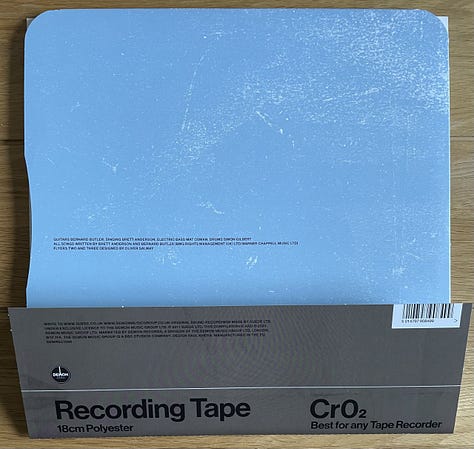

Following on from their recently featured Ocean Colour Scene box, they’re also reissuing ‘B-Sides, Seasides & Freerides’ for its first vinyl outing since 1997. Pulling together all of the bonus tracks from the multi-formatted releases for the ‘Moseley Shoals’ singles, it was originally cut at 45rpm. Whereas this wasn’t replicated for the studio albums, it has been here, which should please the faithful.
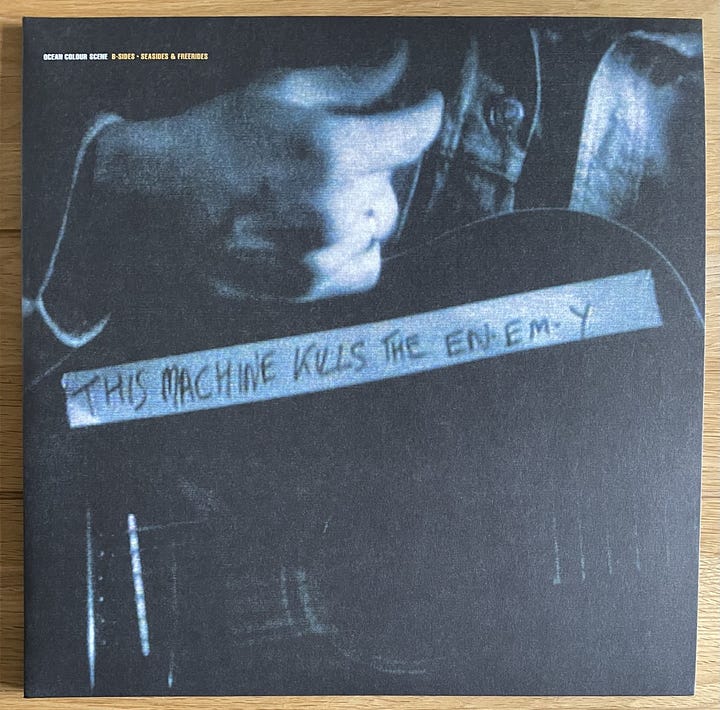

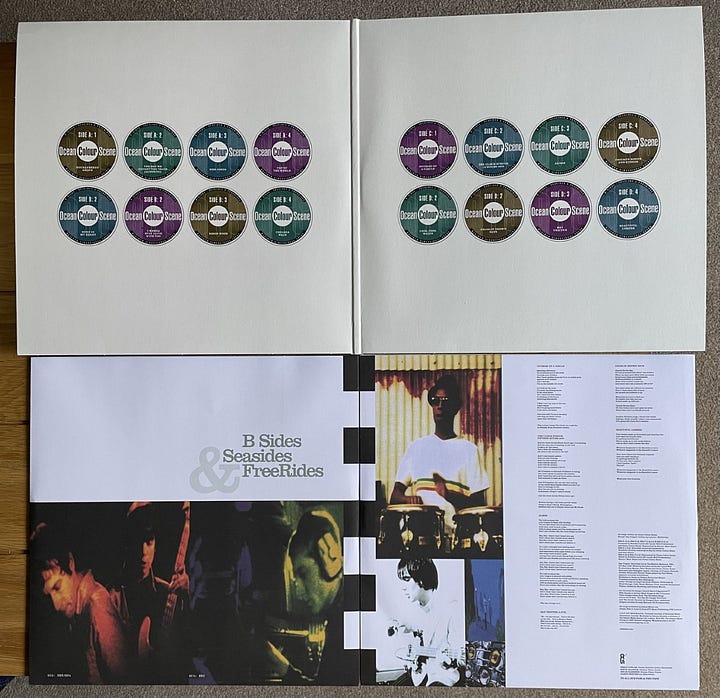
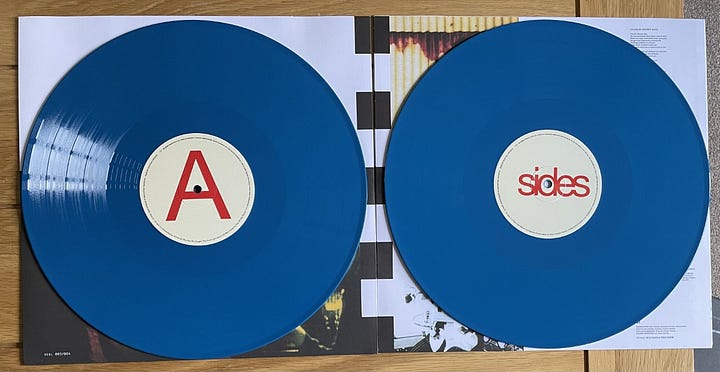
Finally, DANCE MODE!
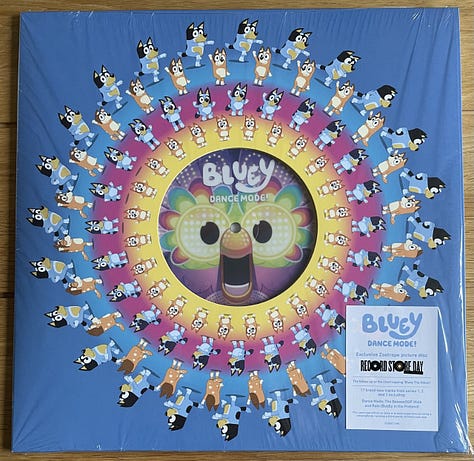
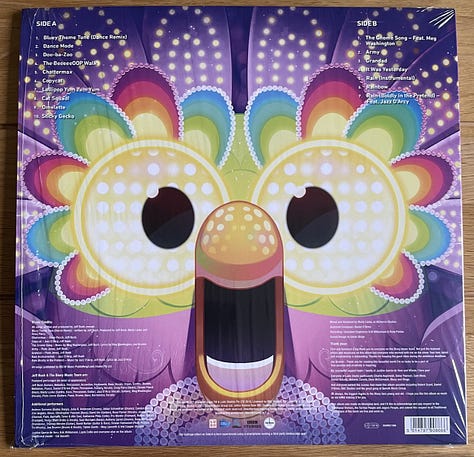
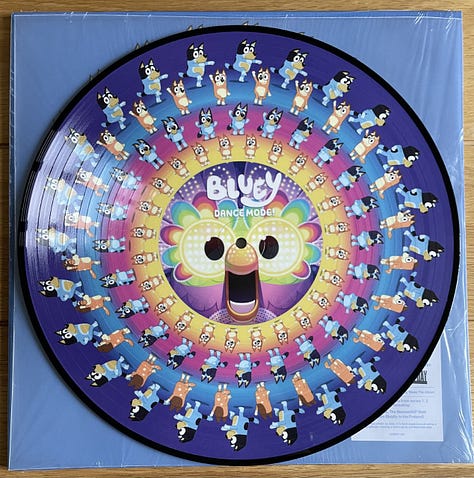
(If your life has yet to be touched by the majesty of Bluey, fire up iPlayer or Disney+ right now)
Image galleries can be fully expanded on the web edition of this post, if you’re currently stabbing away at the email in frustration.
Something for the ‘read all the way to the end’ folk
I do not claim to understand how the record industry works these days, but I am fairly certain that putting an album out as a digital-only release, apart from a US vinyl pressing, didn’t help with the public’s exposure to Amber Coffman’s ‘City Of No Reply’. Nearly six years on from its criminally low-key release, I remain perplexed that this glorious record hasn’t picked up more of an audience. Contemporary coverage noted the obvious narrative around Coffman’s split from Dave Longstreth, with whom she was also a musical partner in Dirty Projectors, and it was a little surprising that people weren’t falling over themselves to offer up comparisons of this and the self-titled release by her former band, having essentially become a solo entity also. It’s worth saying, ‘Dirty Projectors’, with its not entirely gracious response to events, was pretty hard work and everything that ‘Swing Lo Magellan’ wasn’t.
Intriguingly, Longstreth produced ‘City Of No Reply’ and was heavily involved in various aspects of its creation back in 2015, prior to a terminal rift in their working relationship opening up between its completion and that of his own record. Perhaps the twattiest line on that album being “What I want from art is truth / What you want is fame,” all part of a torrent of sniping that Coffman didn’t know was coming until its release was announced to the world. As a result of that timeline, however, it’s wise to detach all of that baggage from this record before listening.
There is so much to enjoy here, rising out of a love of nineties R&B and seemingly obsessed with glorious, strident melodies. Opener ‘All To Myself’ will feel like safe ground for fans of Coffman’s previous work, with languid synths and a lackadaisical beat doused in reverb. It’s an incredibly strong way to set out your stall but the quality never relents. ‘No Coffee’ follows, an emphatically breezy track whose ebullient, Seventies radio sheen is instantly endearing. And they keep on coming. ‘Dark Night’ has those late-Nineties squelchy beats and what sound a little like steel-drum stabs, while ‘If You Want My Heart’ is a poised ballad that wouldn’t have sounded out of place in TLC’s world, twenty five odd years ago.
‘Nobody Knows’ follows an incredible undulating synth part and feels like a critique of our permanently online culture: “I sit fixed, scrolling through words and pictures, like I’m paralysed / Nobody knows, nobody knows how I feel / Nobody sees my soul.” The piano figure with which it concludes is pretty special too. Closer ‘Kindness’ is built around a distorted organ line and talks of how “this love wants not to hinder our evolution.” Having hoped this would mark the start of a technicolour solo career awash with such encyclopaedic pop smarts, there has been total silence since. Hopefully this is either a welcome reacquaintance or a bit of buried treasure for you.




